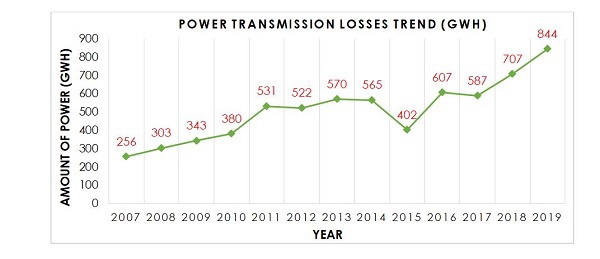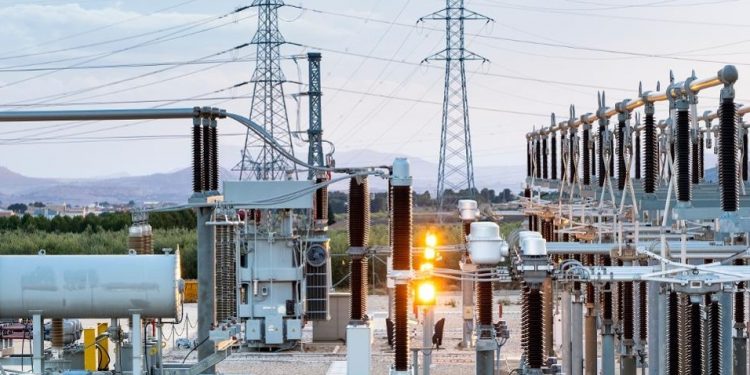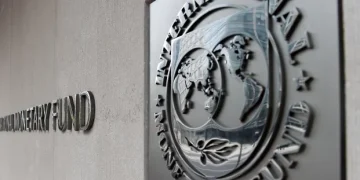Power transmission losses within the Ghana Grid Company (GRIDCo) system keeps surging to 2013 highs and possibly beyond, far in excess of the allowable loss margin.
Review of the “Electricity Supply Plans” from Ghana’s Energy Commission (EC) and data from the Ghana Grid Company (GRIDCo) indicate that since 2008, the rate of transmission losses from total generated power keeps rising largely due to the inefficiencies in the transmission system.
This transmission challenge for electricity have proven to contribute to the key factors that stalls the progress of the power sector and the economy as a whole. The indices of economic growth in many cases rely on the ability to continually enjoy sustained and efficient electricity power supply.
Transmission loss measure the power lost in the transmission of high voltage electricity from power generators to medium voltage power distributors (trading economics). This in simple terms means that, transmission losses are calculated as a percentage of the gross electricity production for the entire period under review.
The losses in any transmission system are mainly in response to technical inefficiencies. It has been identified that the technical losses in Ghana’s power sector result mainly from the continued use of obsolete and faulty equipment that include switchgears, transformers, transmission lines, among many others.
It is instructive to note that until date, some equipment and parts used for the transmission of power in Ghana date as far back as the 1960s, clear recipe for losses in power transmission for the sector.
Review of state documents identified that “with the Aboadze (West) enclave being the biggest generation enclave with an installed capacity of approximately 1540MW, transmission system losses are always higher than the benchmark because maximized power generation is wheeled to as far as Brong-Ahafo region, from the West enclave.
Aside longer transmission lines, the transmission loss increases was found to be driven by the old 161kV transmission lines in the West, and the limitation on the heavily loaded 161kV Volta – Achimota corridor that supplies power to the Capital and its environs.
The over-loading of the 330/161kV autotransformers within Tema, congestion on the 161kV Anwomaso – Kumasi transmission line linking the 330/161kV infrastructure, the unavailability of the 40MVar STATCOM at Tamale etc. were equally identified as contributing factors.
Ghana’s benchmark transmission loss of power in percentage terms to the gross electricity production allowed by the Public Utility Regulatory Commission (PURC) is 3.5 percent in gigawatts hour (GWh).
The 3.5 percent explains that all losses recorded in a production year that falls beyond the 3.5 percent benchmark deteriorates the amount of power produced for transmission, thus becoming cost to the State transmission agency, GRIDCo.
This cost is owed to the production agencies in Ghana, including the Volta River Authority (VRA) and other Independent Power Producers (IPPs).
The country’s best performance in managing losses within the grid were recorded over a decade ago, when the transmission losses recorded was 3.5 percent for both year 2007 and 2008. These results fell right in line with the transmission loss benchmark of the country, and did not come at a cost to the country’s power transmission agency, GRIDCo.
However, since the year 2009, the percentage transmission loss in Ghana’s power sector has risen beyond the allowable of 3.5 percent. In 2009 for instance, the country lost approximately 343 GWh of electricity transmitted, representing a 3.8 percent of total 8,958 GWh transmitted.
In 2010, 2011 and 2012, Ghana recorded transmission loss of 380 GWh, 531 GWh, and 522 GWh respectively, representing 3.7 percent, 4.7 percent, and 4.3 percent of total annual power transmitted.
The trend shows upward, as the only year that transmission losses came close to the PURC benchmark was 2015.
Aside that, the country has been recording losses of 4.4 percent on average terms. After dipping to 4.1 percent in 2017 from 4.4 percent in 2016, the country’s power transmission losses is seeing yet another sharp rise, recording a loss of 4.7 percent in 2019.
In absolute numbers, the amount of power lost to transmission has seen an incremental rise over the last decade. In 2019 for instance, the amount of electricity loss was recorded as 844 GWh, a growth of 16.2 percent over 2018 losses, and 30.5 percent over year 2017 loss figure.
The only year that experienced a dip in losses was year 2015, when the total electricity made available for gross transmission was only 11,692 GWh, as against 13,071 GWh in 2014 and 12,927 GWh in 2013; i.e. 1,379 GWh (about 12%) less than in 2014 and 1,235 GWh (approximately 11%) less in 2013.
Cumulatively, over the last decade, the amount of power lost to transmission is in excess of 5700 GWh, of the approximate 133,156 GWh transmitted within the period. The 5,700 GWh of power lost over the 10-year period is equivalent to one-third of the total power transmitted for consumption in 2019.
It is important to note that the growing debt owed the company by the Electricity Company of Ghana (ECG) and the Northern Distribution Company (NEDCo) hampers the ability of GRIDCo to provide for themselves modern equipment and infrastructures needed to increase efficiency in outputs.
Though technically impossible to completely rid the transmission grid of losses, the provision of the needed investment in the sector would go a long way in beefing-up the system efficiency, and ensuring value-for-money (VFM). The focus must be on attaining either the 3.5 percent benchmark set by the PURC or anything below.








